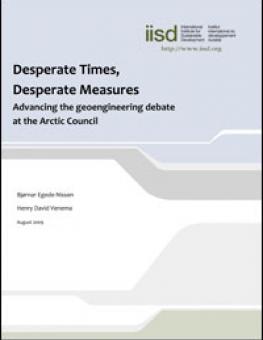
Desperate Times, Desperate Measures: Advancing the geoengineering debate at the Arctic Council
The Arctic is like the canary in the coalmine, warning us about the increasing impact of climate change, which is felt first there. In 2007, the Arctic ice cap shrunk to its smallest size ever recorded, 37 per cent below the recorded average. Its abrupt decline, which deviates widely from the largely linear and predictable trend observed over the past few decades, has alarmed the scientific community and suggests we may be closer to a dangerous "tipping point" than previously anticipated. At the same time, economic globalization is coming to this marginalized region at last through increased resource exploitation, leading in turn to further emissions of greenhouse gases and further climate change.
As unsavoury as it may be, this paper will argue that we must investigate geoengineering as an emergency option in case the mitigation regime fails. Given the dramatic consequences of climate change in the Arctic and the role of this region in the global climate, the Arctic countries have a special responsibility to lead this investigation and the debate surrounding it. As the only circumpolar governance forum on environmental issues, the Arctic Council is an obvious venue for this process. The paper explores the state of global geoengineering governance and how it should be constructed, and how the Arctic Council can contribute.
You might also be interested in
The State of BCAs 2025
As more countries boost their climate ambition, border carbon adjustments (BCAs) are emerging to curb carbon leakage, with the European Union, the United Kingdom, and others advancing their own mechanisms. This publication is the first of its kind taking stock of this trend.
February 2025 | Carbon Minefields Oil and Gas Exploration Monitor
In January 2025, 77 oil and gas exploration licences were awarded in seven different countries, with Norway leading in terms of embodied emissions.
Funding the Future
Practical recommendations for federal infrastructure programs with 14 criteria to better enable natural infrastructure in Canada.
Advancing Green Public Procurement in South Africa
This report analyzes practices and challenges of green public procurement in South Africa and provides recommendations for leveraging public spending to advance sustainability.